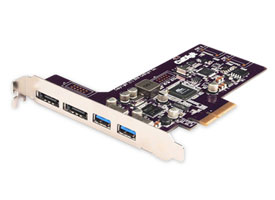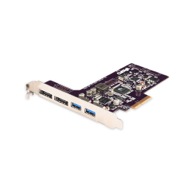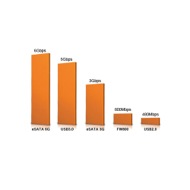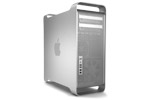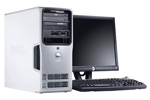I bought this card for my 2008 Mac Pro because it is a 4 lane card and I only have a PCIe 1.0 slot available (1000 MB/s, 2000 MB/s in a PCIe 2.0 slot). Other USB 3.0 cards or eSATA cards are usually PCIe 2.0x1 (500 MB/s) that would only work at 250 MB/s in a PCIe 1.0x1 slot.
The CalDigit documentation/advertisement is, if not false, then incomplete. It lists the maximum speeds of USB 3.0 (5 Gb/s) and eSATA 6G (6 Gb/s) but it does not say what the maximum bandwidth to the computer is from those ports (given an infinite speed USB or eSATA device).
The card uses the following chips: - PLX PEX 8608 8-lane, 8-Port PCI Express Gen 2 (5.0 GT/s) Switch. 4 PCIe 1.0 or 2.0 lanes to the computer, 1 PCIe 2.0 lane to the USB controller, 1 PCIe 2.0 lane to the SATA controller. - Marvell 88SE9123 PCIe SATA 6.0 Gb/s controller - 2 SATA ports, 1 PCIe 5.0 lane to the switch chip. - NEC uPD720200 USB 3.0 Host Controller - 2 USB 3.0 ports, 1 PCIe 5.0 lane to the switch chip.
400 MB/s should be achievable from USB 3.0 with 800 MB/s for two USB 3.0 ports. However, the controller chip is limited by a single PCIe 2.0 lane to 500 MB/s max.
eSATA 6G should be able to get 600 MB/s with 1200 MB/s for two SATA ports. However, the controller chip is limited by a single PCIe 2.0 lane to 500 MB/s max. That's not fast enough to obtain maximum speed from even one eSATA port. The 6 Gb/s max transfer rate they advertise is unattainable, even theoretically.
CalDigit could have made this a two lane card, since the controllers only need one lane each, but two lane cards are treated as one lane cards in some PCIe slots even on some newer PCs. That's something the makers of 2 lane cards like the Mercury Accelsior should have considered...
Fast SSDs (e.g. OWC's 6G SSDs) or RAIDs that can achieve more than 400 or 500 MB/s would be wasted on this card. It works very well for slower drives though. I haven't found many benchmarks that go higher than 250 MB/s. One person noted read speeds of 370 MB/s from an OWC 6G SSD connected to an eSATA port with a RocketStor 5322. Another person said a CalDigit tech support person said the max performance was 250 MB/s due to the PLX chip. Maybe that's why they don't have benchmarks...
None of those speed concerns affect me since I use the card in a PCIe 1.0 slot and use a single USB 3 port to attach a 2.5" hard drive for 114 MB/s. That is the maximum speed of the drive and is better than FW800 so I'm happy.
I use Mac OS X 10.8.2 Mountain Lion. The USB 3.0 ports require drivers to be installed. The eSATA ports do not. The included CD had the latest CalDigit USB drivers. The hard drive appears in System Profiler under the new USB Super-Speed Bus. The drive speed says "Up to 480 Mb/sec" but this is false since it definitely goes much faster than that.
The card can bus-power the portable hard drive. The card doesn't maintain connection to the hard drive when the computer goes to sleep so I recommend not using sleep. I don't know if that's a problem with the driver or with USB 3.0 PCIe cards in general.
1-800-275-4576



